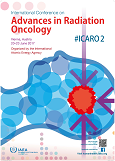Speaker
Hend Daoud
(Radiotherapy department of University Habib Bourguiba Hospital)
Description
Purpuse : Locally recurrent nasopharyngeal carcinoma (NPC) can be salvaged by reirradiation with a substantial degree of radiation related complications.
The aim of this study was to evaluate the dosimetric advantage of intensity modulated radiotherapy (IMRT) in treating locally recurrent NPC.
Methods : Between January 2015 and September 2016, six patients with no metastatic locally recurrent NPC were re-irradiated with concomitant chemotherapy. The median prescrepted dose was 60 Gy with 2 Gy per fraction. Treatment planning of each patient was performed for tow techniques : Three dimensional Conformal radiotherapy (3D CRT) and Intensity modulated radiotherapy (IMRT). The minimum dose (Dmin), the maximuim dose (Dmax) and the volume that received 95% of the dose prescrepted (D95%) of the planning target volume (PTV) and doses to the organs at risk (Spinal cord and brainstem) were calculated and compared for the tow techniques.
Results : All two techniques delivered adequate doses to the PTV. The average Dmin was 48Gy for the two techniques, the average Dmax was 67,5 Gy vs 64,2 Gy respectively for IMRT and 3D CRT (p=0,41) and D95% was 96%.
Concerning the organs at risk, the Dmax for the brainstem was significantly higher for 3D CRT (22 Gy vs 14 Gy, p= 0,003). This finding were similar for the spinal cord (20Gy vs 7,8 Gy). But, the difference was not statically significant (p=0,12).
Conclusion: Based on the dosimetric comparaison, IMRT was optimal by delivering a conformal and homogenous dose to the PTV with significant better sparing of critical organs than 3D CRT. In this regard, re-irradiation using IMRT may be a very attractive technique for locally recurrent NPC.
| Institution | Radiotherapy department of University Habib Bourguiba Hospital |
|---|---|
| Country | Sfax Tunisie |
Primary author
Hend Daoud
(Radiotherapy department of University Habib Bourguiba Hospital)
Co-authors
Jamel Daoud
(Radiotherapy department of University Habib Bourguiba Hospital)
Leila Farhat
(Radiotherapy department of University Habib Bourguiba Hospital)
Najla Fourati
(Radiotherapy department of University Habib Bourguiba Hospital)
Wafa Mnejja
(Radiotherapy department of University Habib Bourguiba Hospital)
Wicem Siala
(Radiotherapy department of University Habib Bourguiba Hospital)

